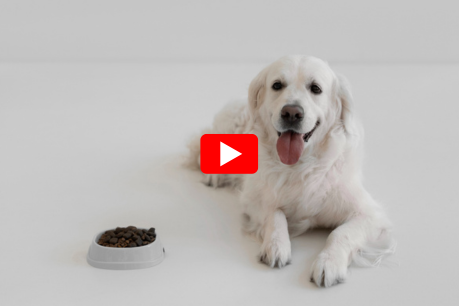Metamucil for Dogs dose Constipation: Safe Guidelines
When it comes to managing digestive issues, both in humans and pets, natural fiber solutions are often front and center.
Psyllium husk a natural soluble fiber is widely used to manage constipation and diarrhea by regulating bowel movements. Its benefits are appreciated across ages and species, including in dogs.
Metamucil can help relieve dog constipation; typical dosage is 1/4 to 1/2 teaspoon per 10 lbs of body weight daily, adjusted for best results.
In this comprehensive guide, we’ll explore the right psyllium husk dosage for diarrhea in humans and also delve into how Metamucil (a popular psyllium husk-based product) can be used safely to treat constipation in dogs.
We’ll cover how psyllium works, dosage recommendations, precautions, and practical tips to optimize digestive health.
What is Psyllium Husk?
Psyllium husk is a dietary fiber derived from the seeds of the Plantago ovata plant. This fiber is soluble, meaning it absorbs water and forms a gel-like substance in the digestive tract.
This gel helps to bulk up stool, soften it, and regulate bowel movements. Because of these properties, psyllium husk is used to treat both constipation and diarrhea.
How Does Psyllium Husk Work for Diarrhea?
At first glance, using fiber to treat diarrhea might seem counterintuitive. However, psyllium’s gel-forming ability plays a key role in absorbing excess water in the intestines, which helps to solidify loose stools.
It also slows down bowel movements, giving the intestines more time to absorb water.
-
Water absorption: Psyllium husk traps water in the intestines, reducing the liquidity of stool.
-
Bulk formation: The gel adds bulk to the stool, which helps normalize bowel movements.
-
Gentle effect: It doesn’t irritate the bowel and helps restore normal function naturally.
Psyllium Husk Dosage for Diarrhea in Humans
Proper dosing is crucial to achieve the desired effect without causing side effects. Below is a general guideline for psyllium husk dosage to manage diarrhea:
-
Starting dose: 3 to 5 grams of psyllium husk (about one teaspoon) once or twice daily.
-
Adjustment: Based on symptom relief and tolerance, the dose can be gradually increased.
-
Maximum dose: Up to 10-20 grams per day split into 2-3 doses.
-
Administration: Mix with at least 8 ounces (240 ml) of water to avoid choking and to ensure effective hydration.
Important Considerations
-
Hydration: Always drink plenty of fluids when taking psyllium husk. Insufficient water can lead to worsening constipation or intestinal blockage.
-
Onset: Psyllium can take 12-72 hours to produce an effect; it’s not a fast-acting remedy.
-
Consultation: Those with existing intestinal blockages or swallowing difficulties should consult a healthcare provider before use.
When Should You Use Psyllium Husk for Diarrhea?
Psyllium husk is often recommended for diarrhea caused by:
-
Irritable bowel syndrome (IBS) with diarrhea
-
Mild to moderate infectious diarrhea
-
Travelers’ diarrhea
-
Antibiotic-associated diarrhea
It is not recommended for severe diarrhea or diarrhea accompanied by high fever, blood in stool, or dehydration without medical supervision.
Potential Side Effects of Psyllium Husk
While psyllium is generally safe, some side effects may include:
-
Bloating or gas
-
Abdominal discomfort
-
Allergic reactions (rare)
-
Choking risk if not taken with enough water
To minimize side effects, start with a low dose and increase gradually.
Metamucil for Dogs Dose Constipation: How to Use Psyllium Husk Safely for Your Dog
Just like humans, dogs can suffer from digestive issues such as constipation. A common and safe remedy for canine constipation is the use of fiber supplements such as Metamucil, which contains psyllium husk as its active ingredient.
What Causes Constipation in Dogs?
Constipation in dogs may result from:
-
Inadequate water intake
-
Lack of dietary fiber
-
Ingesting bones or foreign objects
-
Certain medications
-
Medical conditions such as hypothyroidism or nerve issues
Signs include infrequent bowel movements, straining, dry hard stools, and discomfort.
Why Use Metamucil for Dogs?
Metamucil is a bulk-forming laxative that works by:
-
Increasing stool water content to soften feces
-
Adding bulk to stimulate bowel motility
-
Helping regulate the digestive tract naturally without harsh chemicals
It’s often used to treat mild to moderate constipation in dogs safely under guidance.
Recommended Metamucil Dosage for Dogs with Constipation
Dosage guidelines vary depending on the dog’s weight and health condition. A common recommended dose is:
-
1/4 to 1/2 teaspoon per 10 pounds of body weight once daily.
-
Mix the Metamucil powder with your dog’s food or water to ensure proper ingestion.
-
Observe your dog’s response and consult a vet if constipation persists or worsens.
Example:
-
For a 20-pound dog: 1/2 to 1 teaspoon daily.
-
For a 40-pound dog: 1 to 2 teaspoons daily.
How to Administer Metamucil to Dogs Safely
-
Mix into food or water: Psyllium husk can be mixed with wet food or dissolved in water.
-
Monitor hydration: Dogs must have access to plenty of fresh water.
-
Gradual introduction: Introduce fiber gradually to prevent gas or bloating.
-
Vet consultation: Especially if your dog has underlying health problems.
Signs Your Dog Needs Veterinary Help for Constipation
If your dog shows:
-
No bowel movement for more than 48 hours
-
Vomiting or lethargy
-
Severe abdominal pain or swelling
-
Blood in stool
Seek immediate veterinary care rather than relying solely on Metamucil.
Additional Natural Tips for Managing Diarrhea and Constipation
Whether for humans or dogs, fiber intake is vital but should be balanced with proper hydration and lifestyle adjustments.
For Humans with Diarrhea:
-
Avoid fatty, spicy, or dairy-heavy foods during episodes.
-
Stay hydrated with oral rehydration solutions or clear fluids.
-
Eat bland, low-fiber foods initially if diarrhea is severe.
For Dogs with Constipation:
-
Increase exercise to promote bowel motility.
-
Add small amounts of canned pumpkin (not pie filling) to the diet as a natural fiber source.
-
Ensure clean water availability at all times.
When to Avoid Psyllium Husk or Metamucil
-
If you or your dog have intestinal blockages or narrowing.
-
If you have difficulty swallowing pills or powders safely.
-
In case of known allergy to psyllium or related plants.
-
Dogs with kidney issues or other systemic illnesses should only take fiber supplements under veterinary supervision.
Conclusion
Psyllium husk is a safe, natural, and effective way to manage bowel irregularities such as diarrhea in humans and constipation in dogs. When used correctly with proper dosage and hydration, it helps restore digestive balance gently.
For diarrhea in humans, a dosage of 3-10 grams daily mixed with water is generally effective. For dogs, Metamucil doses of 1/4 to 1/2 teaspoon per 10 lbs of body weight, administered with food or water, can relieve constipation safely. However, monitoring for adverse reactions and consulting healthcare professionals remain essential for both.
Natural fiber supplementation offers a gentle and accessible way to support gut health and comfort, but it should always be paired with good hydration and attentive care.
References Link
- Metamucil for Dogs: Dosage, Safety, and Uses
https://iloveveterinary.com/blog/metamucil-for-dogs-dosage-safety-and-more/
- How to Use Psyllium Husk for Dogs
https://www.whole-dog-journal.com/health/metamucil-for-dogs/
- Psyllium and Fiber in Dog Diets
https://veterinarypartner.vin.com/default.aspx?pid=19239&id=4951754
.



